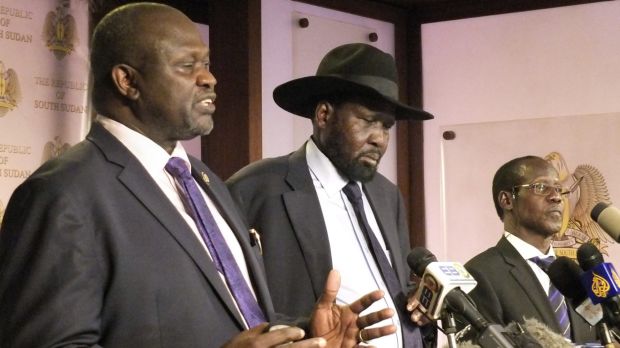South Sudan leaders order ceasefire as civil war fears grow

South Sudan’s president and vice president ordered their loyalists to cease hostilities on Monday after days of fighting threatened to plunge the country back into civil war and bring further instability to an impoverished region of Africa.
Fighting erupted four days ago in the capital Juba between followers of President Salva Kiir and Riek Machar, the former rebel leader who became vice president under a deal to end a two-year civil war.
The violence, which has killed hundreds of people, broke out as the world’s newest nation prepared to mark five years of independence from Sudan on July 9.
“All the commanders of (Kiir’s) forces are directed to cease any hostility and abide by the order and control their forces,” Ateny told Reuters. “President Salva Kiir is determined to carry on his partnership with Riek Machar.”
Machar responded by ordering his troops to stand down.
“The president has declared a unilateral ceasefire, I want to reciprocate the declaration of unilateral ceasefire,” he told the independent Eye Radio.
Much is unclear, however, about the latest violence in Juba, including what the objective of either side has been and how much control Kiir and Machar have over their forces.
The U.S. State Department said it was carrying out an “ordered departure” of its staff from South Sudan.
The fighting has raised fears of a return to the civil war that erupted in late 2013 and broadly ran along ethnic lines, pitting Kiir, an ethnic Dinka, against Machar, a Nuer.
The conflict killed thousands of people, forced more than 2.5 million people from their homes and left almost half the population of 11 million people struggling to find food. Oil production, by far the biggest source of government revenue, has plummeted.
A new flare-up risks driving yet more people to refugee camps in neighboring countries in the central African region, which is already plagued by myriad woes.
Central African Republic is riven by conflict, the eastern region of the Democratic Republic of Congo is contending with a patchwork of militias and rebels groups, and Burundi is embroiled in a violent political crisis.
The U.N. Security Council on Sunday demanded Kiir and Machar rein in their forces and end the fighting. The U.N. mission in South Sudan, UNMISS, expressed its “outrage” after its bases in Juba were caught in the crossfire between the two sides and two Chinese peacekeepers were killed.
The United States condemned the violence and said it would hold those who commit atrocities or impede efforts to stop the fighting “fully accountable.”
“We call on those fighting to return to their barracks. This senseless and inexcusable violence, undertaken by those who yet again are putting self-interest above the well-being of their country and people, puts at risk everything the South Sudanese people have aspired to over the past five years,” White House national security adviser Susan Rice said in a statement.
WRANGLING
Kiir and Machar have long been rivals, both in politics and on the battlefield. Civil war broke out in 2013 a few months after Kiir sacked Machar as his deputy.
Fighting has often erupted outside Juba since the two men signed a peace deal in August last year. But this was the first time it had flared in Juba since Machar finally returned in April after months of wrangling about terms of the pact.
Clemence Pinaud, an assistant professor at Indiana University and an expert on South Sudan, said that tensions increased in Juba during the past month.
“We most likely witnessed an acceleration … into a full-on war in Juba between the two parties,” Pinaud said.
Experts say the failure to swiftly implement important elements of the deal, such as integrating and demobilizing their forces, has allowed tension to fester and risked igniting a new conflict.
U.N. Secretary-General Ban Ki-moon on Monday urged the Security Council to impose an arms embargo on South Sudan, sanction leaders and commanders who blocked the implementation of a peace deal and fortify the UNMISS mission.
There has been no official death toll from the recent flare up but at least five soldiers died on Thursday and a Health Ministry source said 272 people, including 33 civilians, were killed on Friday. Sunday and Monday’s fighting was more fierce.
UNMISS said gunfire had erupted on Monday around the U.N. headquarters in the Jebel area of Juba and also around a base near the airport. It said U.N. sites had been hit in exchanges of fire, killing eight and injuring 67.
Highlighting lawlessness on Juba’s streets, one resident said he saw police officers trying to loot a shop in his neighborhood by shooting off the padlocks and firing in the air to scare away people, echoing similar witness reports on Sunday.
An army spokesman said that any soldier found stealing civilian property or looting would be arrested, and shot at if they resisted.
The African regional grouping IGAD echoed the U.N. Secretary-General’s call to beef up UNMISS’s mandate, calling for it be given an enforcement role similar to a U.N.-backed intervention brigade working in eastern Congo.
Through the civil war, however, world powers and regional states struggled to find leverage over the warring factions, despite U.S. and European sanctions on some military leaders and African threats of punitive actions.
Reuters